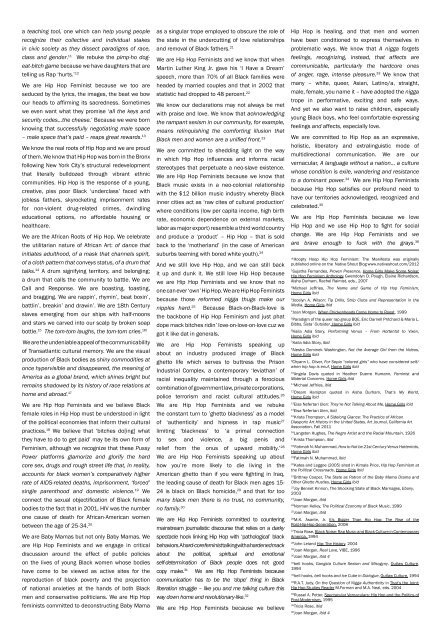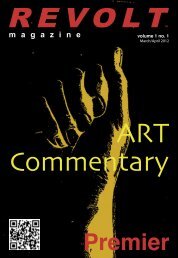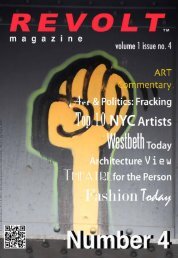Volume 1, Issue No. 2 - Revolt Magazine
Volume 1, Issue No. 2 - Revolt Magazine
Volume 1, Issue No. 2 - Revolt Magazine
You also want an ePaper? Increase the reach of your titles
YUMPU automatically turns print PDFs into web optimized ePapers that Google loves.
a teaching tool, one which can help young people<br />
recognize their collective and individual stakes<br />
in civic society as they dissect paradigms of race,<br />
class and gender. 11 We rebuke the pimp-ho dogeat-bitch<br />
game because we have daughters that are<br />
telling us Rap ‘hurts.’ 12<br />
We are Hip Hop Feminist because we too are<br />
seduced by the lyrics, the images, the beat we bow<br />
our heads to affirming its sacredness. Sometimes<br />
we even want what they promise ‘all the keys and<br />
security codes…the cheese.’ Because we were born<br />
knowing that successfully negotiating male space<br />
– male space that’s paid – reaps great rewards. 13<br />
We know the real roots of Hip Hop and we are proud<br />
of them. We know that Hip Hop was born in the Bronx<br />
following New York City’s structural redevelopment<br />
that literally bulldozed through vibrant ethnic<br />
communities. Hip Hop is the response of a young,<br />
creative, piss poor Black ‘underclass’ faced with<br />
jobless fathers, skyrocketing imprisonment rates<br />
for non-violent drug-related crimes, dwindling<br />
educational options, no affordable housing or<br />
healthcare.<br />
We are the African Roots of Hip Hop. We celebrate<br />
the utilitarian nature of African Art: of dance that<br />
initiates adulthood, of a mask that channels spirit,<br />
of a cloth pattern that conveys status, of a drum that<br />
talks. 14 A drum signifying territory, and belonging;<br />
a drum that calls the community to battle. We are<br />
Call and Response. We are boasting, toasting,<br />
and bragging. We are rappin’, rhymin’, beat boxin’,<br />
battlin’, breakin’ and drawin’. We are 18th Century<br />
slaves emerging from our ships with half-moons<br />
and stars we carved into our scalp by broken soap<br />
bottle. 15 The tom-tom laughs, the tom-tom cries. 16t<br />
We are the undeniable appeal of the communicability<br />
of Transatlantic cultural memory. We are the visual<br />
production of Black bodies as shiny commodities at<br />
once hypervisible and disappeared, the meaning of<br />
America as a global brand, which shines bright but<br />
remains shadowed by its history of race relations at<br />
home and abroad. 17<br />
We are Hip Hop Feminists and we believe Black<br />
female roles in Hip Hop must be understood in light<br />
of the political economies that inform their cultural<br />
practices. 18 We believe that ‘bitches do[ing] what<br />
they have to do to get paid’ may be its own form of<br />
Feminism, although we recognize that these Pussy<br />
Power platforms glamorize and glorify the hard<br />
core sex, drugs and rough street life that, in reality,<br />
accounts for black women’s comparatively higher<br />
rate of AIDS-related deaths, imprisonment, ‘forced’<br />
single parenthood and domestic violence. 19 We<br />
connect the sexual objectification of Black female<br />
bodies to the fact that in 2001, HIV was the number<br />
one cause of death for African-American women<br />
between the age of 25-34. 20<br />
We are Baby Mamas but not only Baby Mamas. We<br />
are Hip Hop Feminists and we engage in critical<br />
discussion around the effect of public policies<br />
on the lives of young Black women whose bodies<br />
have come to be viewed as active sites for the<br />
reproduction of black poverty and the projection<br />
of national anxieties at the hands of both Black<br />
men and conservative politicians. We are Hip Hop<br />
feminists committed to deconstructing Baby Mama<br />
as a singular trope employed to obscure the role of<br />
the state in the undercutting of love relationships<br />
and removal of Black fathers. 21<br />
We are Hip Hop Feminists and we know that when<br />
Martin Luther King Jr. gave his ‘I Have a Dream’<br />
speech, more than 70% of all Black families were<br />
headed by married couples and that in 2002 that<br />
statistic had dropped to 48 percent. 22<br />
We know our declarations may not always be met<br />
with praise and love. We know that acknowledging<br />
the rampant sexism in our community, for example,<br />
means relinquishing the comforting illusion that<br />
Black men and women are a unified front. 23<br />
We are committed to shedding light on the way<br />
in which Hip Hop influences and informs racial<br />
stereotypes that perpetuate a neo-slave existence.<br />
We are Hip Hop Feminists because we know that<br />
Black music exists in a neo-colonial relationship<br />
with the $12 billion music industry whereby Black<br />
inner cities act as ‘raw cites of cultural production’<br />
where conditions (low per capita income, high birth<br />
rate, economic dependence on external markets,<br />
labor as major export) resemble a third world country<br />
and produce a ‘product’ – Hip Hop – that is sold<br />
back to the ‘motherland’ (in the case of American<br />
suburbs teeming with bored white youth). 24<br />
And we still love Hip Hop, and we can still back<br />
it up and dunk it. We still love Hip Hop because<br />
we are Hip Hop Feminists and we know that no<br />
one can ever ‘own’ Hip Hop. We are Hip Hop Feminists<br />
because those reformed nigga thugs make our<br />
nipples hard. 25 Because Black-on-Black-love is<br />
the backbone of Hip Hop Feminism and just phat<br />
dope mack bitches ridin’ love-on-love-on-love cuz we<br />
got it like dat in generals.<br />
We are Hip Hop Feminists speaking up<br />
about an industry produced image of Black<br />
ghetto life which serves to buttress the Prison<br />
Industrial Complex, a contemporary ‘leviathan’ of<br />
racial inequality maintained through a ferocious<br />
combination of government law, private corporations,<br />
police terrorism and racist cultural attitudes. 26<br />
We are Hip Hop Feminists and we rebuke<br />
the constant turn to ’ghetto blackness’ as a model<br />
of ‘authenticity’ and hipness in rap music 27<br />
limiting ‘blackness’ to ‘a primal connection<br />
to sex and violence, a big penis and<br />
relief from the onus of upward mobility.’ 28<br />
We are Hip Hop Feminists speaking up about<br />
how you’re more likely to die living in the<br />
American ghetto than if you were fighting in Iraq,<br />
the leading cause of death for Black men ages 15-<br />
24 is black on Black homicide, 29 and that for too<br />
many black men there is no trust, no community,<br />
no family. 30<br />
We are Hip Hop Feminists committed to countering<br />
mainstream journalistic discourse that relies on a darky<br />
spectacle hook linking Hip Hop with ‘pathological’ black<br />
behaviors. A hard-core feminist talking with a hardened mack<br />
about the political, spiritual and emotional<br />
self-determination of Black people does not good<br />
copy make. 31 We are Hip Hop Feminists because<br />
communication has to be the ‘dope’ thing in Black<br />
liberation struggle – like you and me talking culture this<br />
way down home and revolutionary-like. 32<br />
We are Hip Hop Feminists because we believe<br />
Hip Hop is healing, and that men and women<br />
have been conditioned to express themselves in<br />
problematic ways. We know that A nigga forgets<br />
feelings, recognizing, instead, that affects are<br />
communicable, particularly the hardcore ones<br />
of anger, rage, intense pleasure. 33 We know that<br />
many – white, queer, Asian, Latino/a, straight,<br />
male, female, you name it – have adopted the nigga<br />
trope in performative, exciting and safe ways.<br />
And yet we also want to raise children, especially<br />
young Black boys, who feel comfortable expressing<br />
feelings and affects, especially love.<br />
We are committed to Hip Hop as an expressive,<br />
holistic, liberatory and extralinguistic mode of<br />
multidirectional communication. We are our<br />
vernacular, A language without a nation… a culture<br />
whose condition is exile, wandering and resistance<br />
to a dominant power. 34 We are Hip Hop Feminists<br />
because Hip Hop satisfies our profound need to<br />
have our territories acknowledged, recognized and<br />
celebrated. 35<br />
We are Hip Hop Feminists because we love<br />
Hip Hop and we use Hip Hop to fight for social<br />
change. We are Hip Hop Feminists and we<br />
are brave enough to fuck with the grays. 36<br />
*Hoopty Hoop Hip Hop Feminism: The Manifesta was originally<br />
published online on the Native Shout Blog www.nativeshout.com/2012<br />
1Sujatha Fernandes, Proven Presence, Home Girls Make Some <strong>No</strong>ise:<br />
Hip Hop Feminism Anthology Gwendolyn D. Pough, Elaine Richardson,<br />
Aisha Durham, Rachel Raimist, eds., 2007<br />
2Michael Jeffries, The Name and Game of Hip Hop Feminism,<br />
Home Girls ibid<br />
3Jocelyn A. Wilson: Tip Drills, Strip Clubs and Representation in the<br />
Media, Home Girls ibid<br />
4Joan Morgan, When Chickenheads Come Home to Roost, 1999<br />
5Paradigm of the queer rap group BQE, Eric Darnell Pritchard & Maria L.<br />
Bibbs, Sista’ Outsider, Home Girls ibid<br />
6Kaila Adia Story, Performing Venus – From Hottentot to Vixen,<br />
Home Girls ibid<br />
7Kaila Adia Story, ibid<br />
8Alesha Dominek Washington, <strong>No</strong>t the Average Girl from the Videos,<br />
Home Girls ibid<br />
9Chyann L. Oliver, For Sepia “colored girls” who have considered self/<br />
when hip hop is enuf, Home Girls ibid<br />
10Angela Davis quoted in Heather Duerre Humann, Feminist and<br />
Material Concerns, Home Girls ibid<br />
11Michael Jeffries, ibid<br />
12Dream Hampton quoted in Aisha Durham, That’s My World,<br />
Home Girls ibid<br />
13Eisa Nefertari Ulen: They’re <strong>No</strong>t Talking About Me, Home Girls ibid<br />
14Eisa Nefertari Ulen, ibid<br />
15Krista Thompson, A Sidelong Glance: The Practice of African<br />
Diasporic Art History in the United States, Art Journal, California Art<br />
Association, Fall 2011<br />
16Langston Hughes, The Negro Artist and the Racial Mountain, 1926<br />
17 Krista Thompson, ibid<br />
18 Fatimah N. Muhammad, How to <strong>No</strong>t be 21st Century Venus Hottentots,<br />
Home Girls ibid<br />
19Fatimah N. Muhammad, ibid<br />
20Kates and Leggoe (2005) sited in Kimala Price, Hip Hop Feminism at<br />
the Political Crossroads, Home Girls ibid<br />
21Brittney Cooper, The State as Patron of the Baby Mama Drama and<br />
Other Ghetto Hustles, Home Girls ibid<br />
22Joy Bennet Kinnon, The Shocking State of Black Marriages, Ebony,<br />
2003<br />
23Joan Morgan, ibid<br />
24<strong>No</strong>rman Kelley, The Political Economy of Black Music, 1999<br />
25 Joan Morgan, ibid<br />
26M.K. Asante, Jr. It's Bigger Than Hip Hop: The Rise of the<br />
Post-Hip-Hop Generation, 2008<br />
27Tricia Rose, Black <strong>No</strong>ise: Rap Music and Black Culture in Contemporary<br />
America, 1994<br />
28John Leland Hip: The History, 2004<br />
29Joan Morgan, Real Love, VIBE, 1996<br />
30 Joan Morgan, ibid 4<br />
31bell hooks, Gangsta Culture Sexism and Misogyny, Outlaw Culture,<br />
1994<br />
32bell hooks, bell hooks and Ice Cube in Dialogue, Outlaw Culture, 1994<br />
33R.A.T. Judy, On the Question of Nigga Authenticity in That’s the Joint:<br />
Hip Hop Studies Reader M.Forman and M.A. Neal, eds. 2004<br />
34Russel A. Potter, Spectacular Vernaculars: Hip Hop and the Politics of<br />
Post-Modernism, 1995<br />
35Tricia Rose, ibid<br />
36 Joan Morgan, ibid 4





